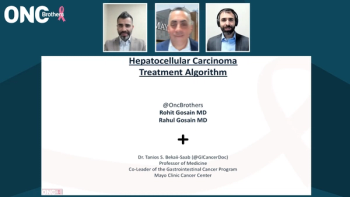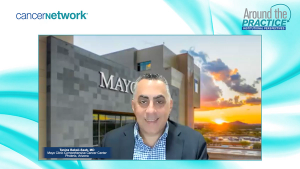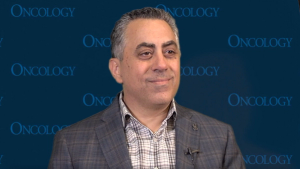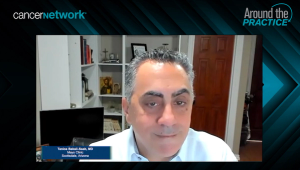
Tanios S. Bekaii-Saab, MD, provides an overview of current therapy options and ongoing initiatives involving targetable alterations in those with pancreatic cancer.

Your AI-Trained Oncology Knowledge Connection!


Tanios S. Bekaii-Saab, MD, provides an overview of current therapy options and ongoing initiatives involving targetable alterations in those with pancreatic cancer.

It may be crucial to test every patient for markers such as BRAF V600E mutations, NRG1 fusions, and KRAS G12C mutations to help manage pancreatic cancers.

Tanios S. Bekaii-Saab, MD, emphasizes the idea of moving targeted therapies to earlier lines of treatment to further improve outcomes in pancreatic cancer.

Experts in gastrointestinal cancer focus on frontline therapy options for patients with pancreatic cancer.

Tanios S. Bekaii-Saab, MD, discusses safety profile considerations for patients undergoing treatment for hepatocellular carcinoma, and the Oncology Brothers recap the entire discussion.

Turning the focus to advanced-stage HCC, Tanios S. Bekaii-Saab, MD, offers comprehensive insights on first- and second-line treatment options.

Medical oncologists outline localized therapy options for patients with early- and intermediate-stage hepatocellular carcinoma.

Tanios S. Bekaii-Saab, MD, joins Rahul Gosain, MD, and Rohit Gosain, MD, to discuss treatment practices for early- and intermediate-stage hepatocellular carcinoma.

The panelists close by emphasizing key takeaways regarding the management of HER2+ colorectal cancer, including early molecular profiling to enable targeted therapy sequencing, assessing HER2 amplification level, and having a strategic plan upfront mapping out potential targeted therapy options rather than just starting chemotherapy.

Drs Ciombor and Ahn discuss emerging HER2-targeted therapies in colorectal cancer, including antibody-drug conjugates and novel antibodies.

The panel reviews treatment strategies for HER2-positive metastatic colorectal cancer patients in various scenarios, including those with HER2 mutations, RAS mutations, and different levels of HER2 expression, emphasizing the importance of reprofiling and considering the duration of response before changing treatment approaches.

Experts explore the management of interstitial lung disease in patients with colorectal cancer receiving treatment with trastuzumab deruxtecan and the consideration of liquid biopsies to assess HER2 status and adapt treatment strategies.

Dr Stacy A. Cohen discusses the DESTINY-CRC01 trial investigating trastuzumab deruxtecan in patients with colorectal cancer, specifically addressing the use of a targeted therapy for HER2 in colorectal cancer patients, highlighting the importance of prior therapy history and optimal dosage to balance efficacy and toxicity.

Tanios S. Bekaii-Saab, MD, presents the case of a 64-year-old woman with HER2+ colorectal cancer to the panel for discussion.

Kristen K. Ciombor, MD, discussed the ongoing MOUNTAINEER-03 trial, a global Phase 3 study randomizing patients with untreated HER2-positive colorectal cancer patients to FOLFOX plus tucatinib/trastuzumab versus standard chemotherapy plus a biologic, which she said highlights the importance of upfront molecular testing and could change treatment.

Toxicities with tucatinib in patients with colorectal cancer like fatigue and GI issues are generally manageable but still require close monitoring, with early optimization of diarrhea management being key to allow patients to stay on effective treatment long-term.

Personalized therapy tailored for mutation status is something to expect in the coming years for colorectal cancer treatment, notes Tanios S. Bekaii-Saab, MD.

In the Phase 2 MOUNTAINEER-01 study of patients with HER2-positive metastatic colorectal cancer who were chemo-refractory, the combination of tucatinib and trastuzumab showed an impressive response rate and disease control rate, and median duration of response up to 12 months; Dr. Ahn notes these results compare favorably to prior studies of dual HER2 inhibition, with MOUNTAINEER-01 showing higher response rates.

Christina S. Wu, MB, BCh, MD, presents the case of a 50-year-old man with metastatic colorectal cancer to the panel for discussion.

Drs Cohen, Wu, and Ahn discuss HER2 in colorectal cancer, explaining that increased expression indicates possible benefit from HER2 inhibitors; Ahn summarized studies showing modest activity of dual HER2 inhibition compared to single agent trastuzumab.

Drs Wu, Ciombor, and Cohen discussed upfront molecular testing in patients with colorectal cancer to guide treatment, with Dr Ciombor reviewing HER2 testing methods and Dr Cohen noting liquid biopsy limitations.

Drs Ahn and Cohen discuss the treatment of colorectal cancer, reviewing the available options and describing factors influencing treatment choice and use of maintenance therapy after initial response.

Stacy A. Cohen, MD, provides an overview of colorectal cancer, noting increasing incidence in younger patients; Christina S. Wu, MB, BCh, MD, discussed possible reasons for more colorectal cancer in younger people, including genetic predisposition and exposures, though the causes remain unclear.

Christina Wu, MB, BCh, MD, closes the program by expressing the necessity of enrolling patients with BRAF-mutant metastatic colorectal cancer in clinical trials, highlighting a second-line study led by the Southwest Oncology Group, new BRAF inhibitors, early phase studies at the Mayo Clinic, and an exciting study in the adjuvant setting.

Christina Wu, MB, BCh, MD, shares data from the phase 3 BREAKWATER trial, which assesses first-line targeted treatment strategies for patients with BRAF V600E-mutant metastatic colorectal cancer.

Daniel Ahn, DO, describes the BEACON study, a randomized phase 3 trial in metastatic colorectal cancer that led to the FDA approval of a doublet regimen.

Christina Wu, MB, BCh, MD, discusses BRAF V600E mutations in metastatic colorectal cancer, including the various detection methods, the different classes of BRAF mutations, and the evolution of targeting treatments.

Daniel Walden, MD, presents the scenario of a 66-year-old man diagnosed with BRAF V600E-mutant metastatic colorectal cancer to the expert panel for discussion.

In a detailed conversation, Tanios Bekaii-Saab, MD, Daniel Ahn, DO, and Christina Wu, MB, BCh, MD, discuss various scenarios for treating HER2+ metastatic colorectal cancer, focusing on patient profiling, testing methods, and different sequencing strategies including the use of trastuzumab.

Daniel Ahn, DO, and Tanios Bekaii-Saab, MD, detail the findings of the DESTINY-CRC02 trial, which examined the efficacy of trastuzumab deruxtecan at different dosing levels in breast cancer and gastric cancer patients.

Published: November 28th 2023 | Updated:

Published: June 28th 2023 | Updated:

Published: August 15th 2022 | Updated:

Published: July 12th 2021 | Updated:

Published: December 14th 2022 | Updated:

Published: February 24th 2023 | Updated: